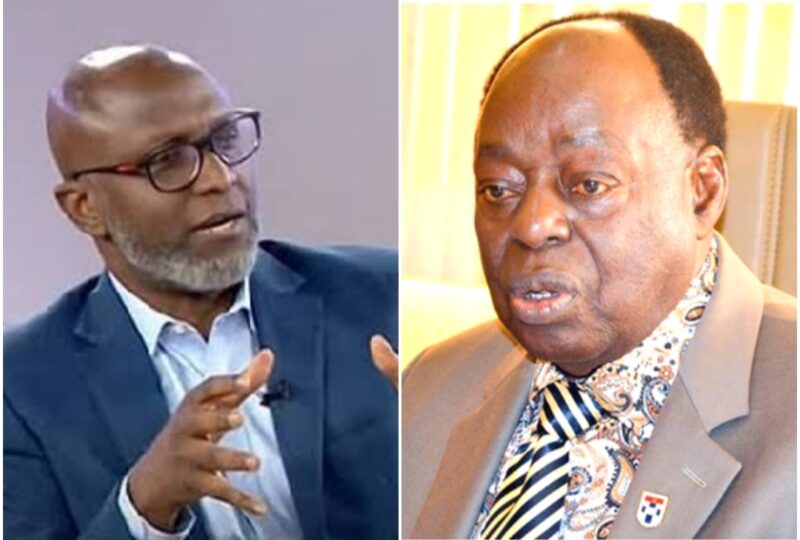Former presidential spokesperson Laolu Akande has urged legal luminary Chief Afe Babalola, SAN, to adopt a civil approach in addressing alleged defamatory statements made by activist and author Dele Farotimi. Speaking on Channels Television’s Sunrise Daily, Akande cautioned against using state instruments for personal grievances, emphasizing the need for adherence to democratic principles and judicial precedents.
Akande noted “I think the first place to start is Pa Afe Babalola, SAN a legal luminary that we all respect felt that he’s been libelled. And I think there are very significant proof to say that if you read the [Farotimi’s] book and watched his interviews, I don’t think Farotimi himself made any pretentions that he’s actually going after this guy. So, there is the basis for Afe Babalola to be aggrieved. And there’s a basis for him to pursue redress.
“What I think is inelegant is that you’ll expect somebody like Chief Afe Babalola with all of his respect and regard, that he will rather pursue this matter as a civil case. There’s a ruling of the Court of Appeal where the Court of Appeal said that individuals should not, in 1982, in the case between Author Nwankwo vs the State use the instrument of state in the pursuit of your own personal fight. You’ll expect that someone like Afe Babalola should know that.”
Farotimi wrote the book NIGERIA AND ITS CRIMINAL JUSTICE SYSTEM earlier this year where he allegedly made defamatory remarks against Chief Babalola.
In the case of Arthur Nwankwo vs. The State (1982), the Court of Appeal ruled against then-Anambra State Governor Chief Jim Nwobodo for using state institutions to harass Nwankwo, the governorship candidate of the People’s Redemption Party and fierce critic of the former’s administration, who authorised two publications accusing Nwobodo of maladministration.
Akande acknowledged Babalola’s stature and contributions to the legal profession but emphasized the need for decorum and adherence to established legal principles. He expressed concern over the implications of criminalizing defamation, particularly in a democratic society where freedom of expression is a fundamental right.
According to Akande, someone like Afe Babalola should not “have been involved in calibrating or instigating the police to harass Mr Farotimi the way we have all seen on video.”
“Afe is aggrieved and he should pursue his right. But you’ll expect somebody in class or with his reputation- Afe Babalola is an icon in Nigeria – to put that in view and rather seek a civil process,” Akande said.
On the recent seizure of 753 houses in Abuja by the Economic and Financial Crimes Commission (EFCC) which has sparked widespread discussion, the veteran journalist called on the federal government to auction the properties and address Nigeria’s housing deficit.
Akande expressed astonishment at the scale of graft exposed by the EFCC’s operation. He noted that the extent of greed uncovered through these seizures is unprecedented and disturbing.
“I was shocked because one had no way of finding out that this level of graft or greed existed. I don’t think you can escape not being shocked at the extent of greed based on what we know and the information that is already in the public space,” he said.
He dismissed claims that the EFCC had concealed the identities of those involved. According to him, the names linked to the properties are already in the public domain through accessible court documents.
“People say that EFCC didn’t name people. That’s not technically true. Because the court papers are public documents except they are sealed. In this case, Empowered Newswire found out that those papers are not sealed and the names were there,” he clarified.
Akande also highlighted lapses in the Federal Capital Development Authority’s (FCDA) background checks for issuing development licenses. He questioned the criteria under which vast estates, many of which remain unoccupied, were built.
“I know that for the FCDA, they do give development licenses to people to help develop this city. I have not myself looked at their codes…but I know that people have raised questions,” he said.
He urged the FCDA to educate Nigerians on their regulatory processes and address concerns over abandoned and underutilized prime properties, particularly in a city where housing deficits persist.
Akande stressed the need for immediate action to make seized properties useful to Nigerians. Highlighting the prevalence of empty estates in Abuja, he emphasized that the government should not let such properties waste.
“If you drive into Abuja, you’ll see a bit of prime properties that are empty. It’s heart-rending that there are problems of housing and then these huge estates are just empty. As these things are being retrieved, they should find a way to turn it around for people to hire,” Akande suggested.
He also commended the EFCC for their proactive measures, describing the seizure as a commendable instance of crime-bursting.










